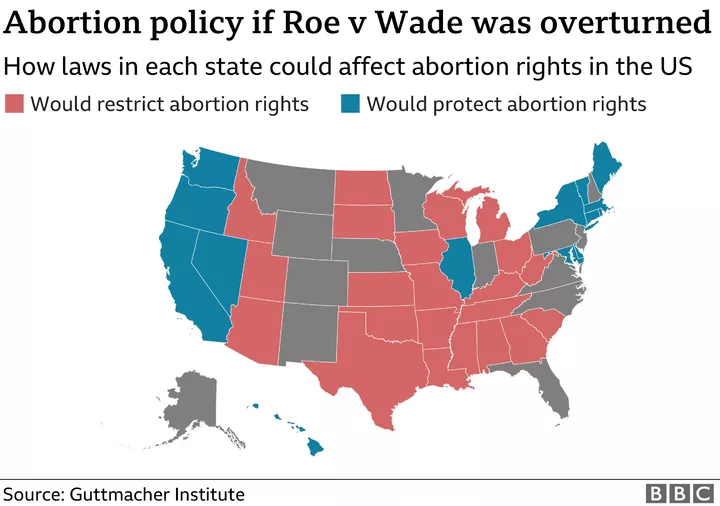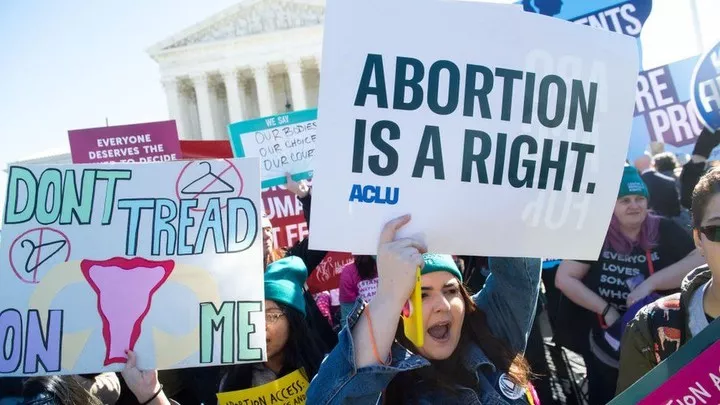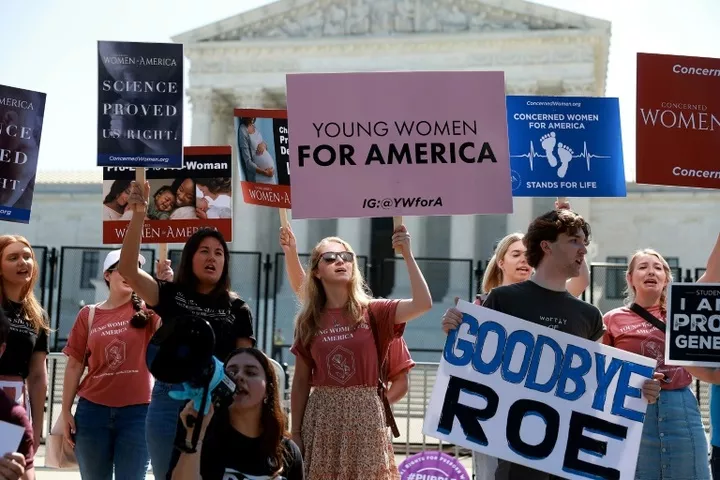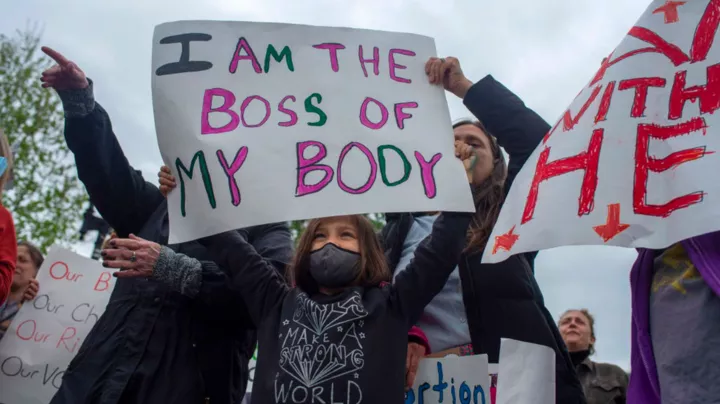A few days ago, the U.S. Federal Supreme Court overturned the 1973 Roe v. Wade decision, declaring that "the Constitution does not grant a right to abortion" and allowing states to decide for themselves whether abortion is legal. The move triggered a global cultural 'earthquake': President Joe Biden said 'this ruling sets America back 150 years', people in the US took to the streets in protest, and leaders in the UK and France publicly criticised it.
Since the appointment of three conservative justices by former US President Donald Trump, coupled with the rising tide of conservatism for years, and the 'leak' of the draft conservative Justice Alito decision in May this year - Roe v. Wade was overturned and everyone in the know knew it was only a 'matter of time'.
Ostensibly fighting over the right to abortion, Roe v. Wade has long gone beyond health and women's rights to become a constitutional, legal, moral and political 'life and death proposition' in the United States.
The top concern of American women is reflected in the 'explosion' of the physiological tracking app Stardust. At one point, the app soared to the top of the Apple App Store in the US and promised to encrypt user data and not hand it over to the government.
App, can it help people take back their abortion rights?
Flipping the right to abortion
"Roe v. Wade was overturned, affecting women of childbearing age first.
The Republican-held "red states" have already banned abortion across the board and have been planning legislation to ban women in their states from going to other states for abortions, while the Democrat-held "blue states" have no guarantee that a blanket ban will not be issued at the federal level in the future, and may be saddled with lawsuits with other states as a result.
With the legal risks of abortion already much higher for women of childbearing age, and the inherent health risks of abortion, it makes sense to use technology such as software applications like Stardust and Clue to watch and record your cycle and pregnancy dates.
In addition to downloading tracking apps, women are stocking up on emergency contraceptives in droves. CVS and Rite Aid Corp pharmacies in the U.S., announced this Monday that they are limiting purchases to a maximum of three pills per person to ensure they can keep up their supply.
At the same time, demand for IUDs that provide long-term contraception is surging, and more and more consumers are making appointments to buy them online.
Second, for women who are already pregnant, the process of giving birth or having an abortion becomes difficult. An editorial in The Lancet noted that about 120 million unintended pregnancies occur worldwide each year, three fifths of which end in abortion, and that abortion is likely to be safe, provided it is done using medically recommended methods and by trained professionals.

After abortion rights were banned in several states, it became less 'probabilistically safe' for patients to abort, what circumstances make abortion appropriate, and how to define the difference between abortion and miscarriage. In Texas, where 'facilitating an abortion' carries a maximum penalty of life in prison, doctors are simply afraid to make recommendations that 'cross the line'.
Abortion groups in "red states" such as Mississippi and Texas have to seek help across state lines. The average distance to receive care has increased from 25 miles to 125 miles. These people are often marginalized groups such as minorities and are not wealthy.
In addition, insurance companies and clinics are affected. The former have to research legal procedures to help pregnant women get abortions across state lines, and also leave employers and public interest groups to deal with higher employment cost issues and logistics. Clinics and doctors face additional clinical dilemmas, such as deciding between 'hysterotomy' and 'evacuation abortion procedures' - the former does not trigger a 'right to abortion' ban, but increases the risk of complications for patients.
Data persecution
The demand for abortion is high among American women. One third have experienced an "abortion" in the broad sense, including the use of abortifacients.
This part of the need, while tech companies offer physiological period tracking apps that provide part of the solution, also implies a high level of risk. Data from apps about physiological periods, pregnancy periods, hormone fluctuations, etc. can now be used to prosecute women who intend to have an abortion. Those states with 'abortion bounties' can also use this data to engage in political persecution.
Texas passed a law last year that any citizen who successfully prosecutes a woman who is six weeks pregnant and planning to have an abortion, a health care worker, or anyone who helps with an abortion can receive a bounty of at least $10,000. Other 'red states' have the idea of copying it.

This scenario makes sense that Stardust is 'on fire'. That's because the founders make a big deal about the app using encryption and that the data is not controlled by the government. According to Sensor Tower, on June 24, the day Roe v. Wade was upended, Stardust reached 135,000 new installs, a 4,400 % increase over the previous day's installs. The next day, it added another 200,000 installs, moving from #119 in the app store to #1.
The concerns are not unreasonable. Similar body data recording apps have a previous 'history' of sharing data with third-party tracking and analytics companies. Last year, an app called Flo violated privacy policies and required a settlement with the Federal Trade Commission. Another app, called Glow, settled with the state of California for exposing medical information about women.
There is no definitive proof that Stardust's encryption is reliable. Its official description has removed the words 'end-to-end encryption' - which was previously trumpeted.
The scary part is that not only physiological tracking apps, but browsers, search history, email, text messages, logs, and other commercial apps that need to be opened every day, can expose users' physiological data. The Supreme Court's ruling sharply amplifies the fear of user privacy exposure.
The Register recently reached out to Amazon, Microsoft, Google, Meta and Twitter to ask "What will your company do to ensure that the data collected is not used to prosecute women seeking abortions, as well as individuals or organizations that provide abortion support?" The tech giants are not responding at this time.
Where do human rights begin
The right to abortion is important and sensitive because it implicates the jurisprudential question of how rights are derived.
This comes after the full text of a draft decision in Dobbs v. Jackson Women's Health Organization (Mississippi 15-week abortion case), suspected to have been written by Supreme Court Justice Samuel Alito (Alito), surfaced online. Alito, a hardcore conservative, took a direct shot at Roe v. Wade, saying it made a "grossly absurd error" to begin with.
His opinion is that the right to abortion is neither a constitutional right nor a right so deeply rooted in the history of American society that it makes no sense for the Supreme Court to "legislate" it. In other words, this is an "originalist" view - the Supreme Court can only interpret and interpret the Constitution and the law, it is not a legislator.

And the radical 1973 decision, when the Supreme Court legislated by precedent - directly declaring the right to abortion legal throughout the United States. The decision also left an unbridgeable 'gap' by not treating the right to abortion as a fundamental right and thus giving it full constitutional protection, but by using the inherently controversial right to privacy as the supporting theory for the right to abortion. This is a very 'activist' approach.
However, not all conservative judges prefer "originalism", while liberal judges prefer "activism". We still follow our own values, and jump across the line repeatedly when we need originalism, and when we need activism.
After Roe v. Wade legalized abortion rights throughout the United States in 1973, the issue of abortion was "expanded" from a health issue to a constitutional and political one.20 The activism of the liberal wing of the U.S. Supreme Court during the affirmative action wave of the 1960s and 1970s was phenomenal. At the same time, anti-abortion forces went from local to national, expanding from a very small segment of Catholicism to evangelical Christianity and among social conservatives.
Since the right to abortion back then was derived from the 'right to privacy', the prohibition of the former also meant that a range of privacy rights became less 'stable' along with it. Including the associated right to same-sex marriage and the right to contraception, all became precarious.

People think more about the ownership of the right to abortion. Whether a woman's (pregnant) body belongs to herself or to the public sphere, such as the state/society, is interpreted differently in different countries, regions, and cultures. At the same time, to whom does the body of the fetus belong?
Biologists from 15 countries provide the biological answer: life and the right to life begin with the union of the sperm and the egg.
From where human rights begin, morality and law must also begin. However, where do human rights begin? No one knows exactly.
Technology, on which people once relied so heavily, can hardly be effective when rights are undefined.